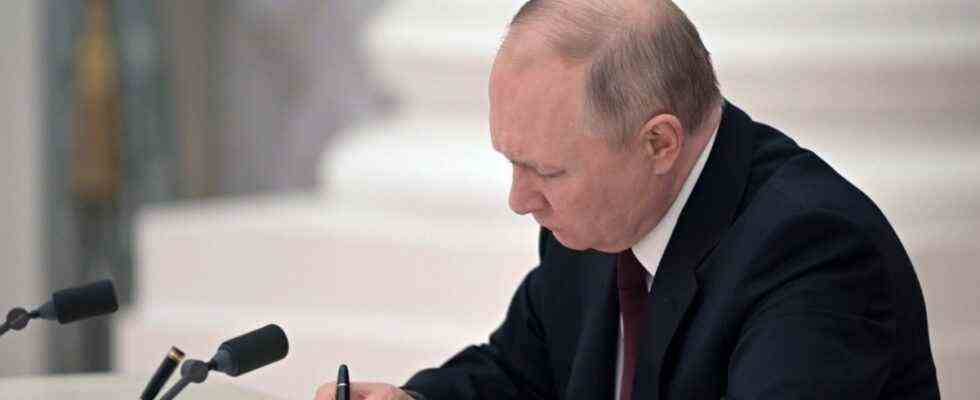A speech by Russian President Vladimir Putin shocked the world. In it, Putin not only recognized parts of eastern Ukraine as independent states, but also warned NATO against expanding further east. The international press sees two main things in the televised speech: a demonstration of power by Putin and a threat to peace in Europe.
“Fiery, Emotional and Hurt”: New York Times
the New York Times describes the tone of Putin’s speech as “fiery”, “emotional and hurt”. They see the speech as “a thinly veiled threat to President Volodymyr Zelensky’s government” – and to peace in Europe: “By trying to redraw Europe’s post-Cold War borders and put Ukraine back in orbit By forcing Moscow, Putin is seeking nothing less than to overthrow the security structure that has helped sustain a difficult peace on the continent over the past three decades.”
“Putin’s incendiary speech apparently recorded beforehand”: Frankfurter Allgemeine Zeitung
In the Frankfurter Allgemeine Zeitung Friedrich Schmidt and Michaela Wiegel describe the performance as “Putin’s apparently pre-recorded incendiary speech” that “(draws) a picture of the neighboring country, the failing one, whose population is emigrating. One of ungrateful ‘relatives’, with whom ‘extreme nationalists, Russophobes and neo-Nazis ‘ set the tone, who did not serve the ‘real people’, but ‘geopolitical opponents of Russia”https://www.sueddeutsche.de/medien/.”
They see Putin’s domineering behavior towards Sergey Naryshkin, director of the foreign intelligence service SWR, as particularly noteworthy, “when he avoided saying whether he supported the recognition of the ‘people’s republics’. (…) ‘We don’t talk about that,’ continued Putin approached him, and the visibly intimidated Naryshkin finally came out and said he was in favor of the recognition.”
“Act of the greatest possible staging”: time
In the Time Maxim Kireev interprets Putin’s appearance as an “act of the greatest possible staging (…) orchestrated down to the last detail” and sees the speech and the signing of the friendship treaties between Russia and the separatist areas as the end of the Minsk agreement: “Russia can handle the situation on the one hand, Putin has not dropped his demands for security guarantees and a rejection of Ukrainian NATO membership example, that today’s Russian recognition also includes these areas, which are currently under the control of the Ukrainian military. (…) In plain language, Putin’s threat should mean that the Russian army is still ready for a military strike against Ukraine.”
“Supreme leader who rounds up his followers”: The Guardian
in the Guardians Shaun Walker sees an “absurd, angry spectacle” in Putin’s speech. And he accuses Putin of having staged the situation as a show of power: “This was not a politician who called his team together for talks, but a supreme leader who gathered his followers and took collective responsibility for a decision that would at least change the security architecture in Europe will change and possibly lead to a terrible war that will engulf Ukraine. (…)
As a symbol of his growing isolation, with no peers to disagree with him or discuss his ideas, Putin has recently taken to meeting with politicians, including his own ministers, at ostentatiously large tables, apparently as a precautionary measure. But at Monday’s Security Council meeting, when, exceptionally, a long table would have been appropriate, Putin sat alone and watched his subordinates from an absurd distance as they shifted awkwardly in their chairs, waiting their turn, from boss to be questioned.”
“Bold Choices of the West”: La Repubblica
the Republica According to Putin, by recognizing Donetsk and Luhansk he was trying to “rewrite history”. In doing so, he continued the “amok drive to change the European borders with military force”. What the West needs now is clear to the Italian daily: “The war has never been so close and now it’s time for the entire West to make bold political decisions. It’s time that the Ukraine will be fully integrated into the European family. Together with a clear and very tough sanctions system, this is the best response that can be given to a completely unjustified military threat at the gates of Europe.”

